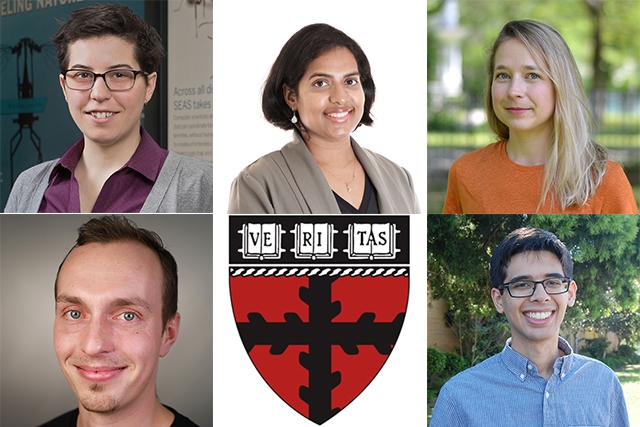News
Harvard's 2021 Siebel Scholars (clockwise from upper left), Julia Ebert, Anitha Gollamudi, Sophie Hilgard, Bryan Wilder, and Fritz Lekschas
Five computer science graduate students at the Harvard John A. Paulson School of Engineering and Applied Sciences (SEAS) have been named 2021 Siebel Scholars.
Julia Ebert, Anitha Gollamudi, Sophie Hilgard, Fritz Lekschas, and Bryan Wilder will each receive a $35,000 award for their final year of graduate studies.
They are among 92 students who join past Siebel Scholars to form a professional and personal network of more than 1,500 scholars, researchers, and entrepreneurs. Through the program, this group brings together diverse perspectives from business, science, and engineering to influence the technologies, policies, and economic and social decisions that shape the future.
“Every year, the Siebel Scholars continue to impress me with their commitment to academics and influencing future society. This year’s class is exceptional, and once again represents the best and brightest minds from around the globe who are advancing innovations in healthcare, artificial intelligence, the environment and more,” said Thomas M. Siebel, chairman of the Siebel Scholars Foundation. “It is my distinct pleasure to welcome these students into this ever-growing, lifelong community, and I personally look forward to seeing their impact and contributions unfold.”
Founded in 2000 by the Thomas and Stacey Siebel Foundation, the Siebel Scholars program awards grants to 16 universities in the United States, China, France, Italy, and Japan. Following a competitive review process by the deans of their respective schools on the basis of outstanding academic achievement and demonstrated leadership, the top graduate students from 27 partner programs are selected each year. On average, Siebel Scholars rank in the top 5 percent of their class, many within the top 1 percent.
Student biographies
Julia Ebert is a computer science Ph.D. candidate, advised by Radhika Nagpal, Fred Kavli Professor of Computer Science. Her research focuses on creating algorithms for distributed decision-making in robot swarms. Specifically, she is developing a modular framework for allowing robots to collectively solve a variety of environmental classification and localization problems. She aims to take an interdisciplinary approach to collective robotics, integrating bio-inspiration and mathematical modeling to develop algorithms that can be applied beyond the lab. During her Ph.D., Ebert was also a Department of Energy Computational Science Graduate Fellow, through which she interned at Lawrence Livermore National Laboratory. Previously, she earned an MRes in bioengineering at Imperial College London as a Marshall Scholar and a bachelor’s degree in behavioral neuroscience at Northeastern University.
Anitha (Boyapati) Gollamudi is a computer science Ph.D. candidate, advised by Stephen Chong, Gordon McKay Professor of Computer Science. Her research enforces security in software applications against powerful cyber attackers. Specifically, she leverages trusted execution environments, a hardware-based technology, to provide formal guarantees in security-critical applications. Her work enables a step closer toward secure collaboration of mutually distrusting parties by still maintaining their compliance to privacy governing laws such as HIPAA and FERPA. Prior to joining graduate school, Gollamudi was a compiler engineer at Atmel (now Microchip) and Advanced Micro Devices. She was one of the early engineers to develop an AVR-GCC compiler toolchain. Besides research, she is interested in writing story books that introduce diverse cultures to young children. This was born out of the necessity to introduce her toddler to all the interesting stories she listened to as a child. Her first picture book is expected to be released soon. Gollamudi holds a bachelor’s degree in computer science engineering from Andhra University, India.
Sophie Hilgard is a Ph.D. candidate in computer science, advised by David C. Parkes, George F. Colony Professor of Computer Science. Her research studies the impact of human psychological factors, including fairness, explainability, and biases in computer-assisted decision-making. She has served as a teaching fellow for computer science courses and the Business Analytics Program, jointly offered by SEAS and the Harvard Business School. She recently interned at Twitter Cortex. Previously, Hilgard worked as a municipal bond trader for six years. She holds a bachelor’s degree in applied mathematics and a master’s degree in computational science and engineering from Harvard University.
Fritz Lekschas is a Ph.D. candidate in computer science advised by Hanspeter Pfister, An Wang Professor of Computer Science. His research focuses on the development of scalable visual exploration systems for analyzing epigenomic patterns. In his studies, Lekschas uses visualization as the primary means of interacting with data, and human-centered AI methods to guide decision making at scale. His work has won several awards, including the Best Paper Award at the 2020 EuroVis Conference and an Honorable Mention Award at the upcoming 2020 IEEE Visualization Conference. Prior to joining the doctoral program, Lekschas visited Harvard Medical School as a post-graduate research fellow to work with Nils Gehlenborg, Assistant Professor of Biomedical Informatics, and Peter J. Park, Professor of Biomedical Informatics, on ontology-guided exploration of biomedical data repositories for his master's thesis. He earned his bachelor’s and master of science degrees in bioinformatics from the Freie Universität Berlin, Germany.
Bryan Wilder is a Ph.D. candidate in computer science, advised by Milind Tambe, Gordon McKay Professor of Computer Science. His research focuses on developing artificial intelligence methods to improve public health. Applications include optimizing HIV prevention interventions, predicting tuberculosis medication adherence, and modeling COVID-19 dynamics. Wilder’s technical areas of focus include discrete optimization, machine learning, and social networks. The goal of this research program is to connect methodological advances in artificial intelligence with concrete interventions to address social problems. Wilder was awarded an NSF Graduate Research Fellowship, and his research has been recognized with best paper nominations at the International Conference on Machine Learning and the International Conference on Autonomous Agents and Multi-Agent Systems. Before graduate school, he received a bachelor’s degree in computer science from the University of Central Florida.
Topics: Awards, Computer Science, Graduate Student Profile
Cutting-edge science delivered direct to your inbox.
Join the Harvard SEAS mailing list.
Press Contact
Adam Zewe | 617-496-5878 | azewe@seas.harvard.edu



